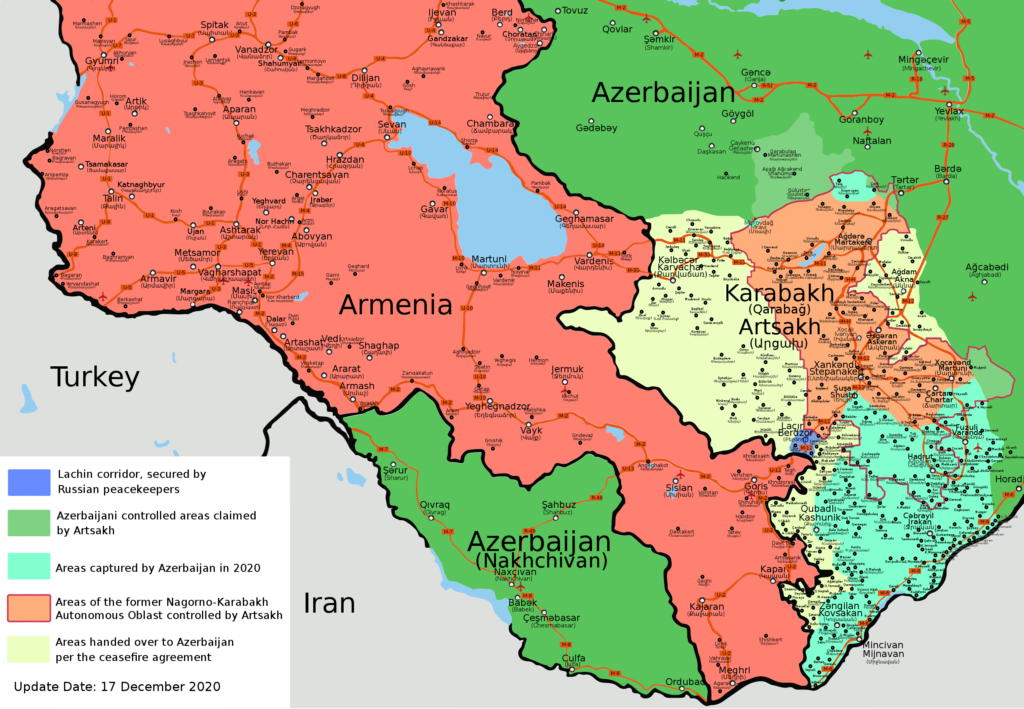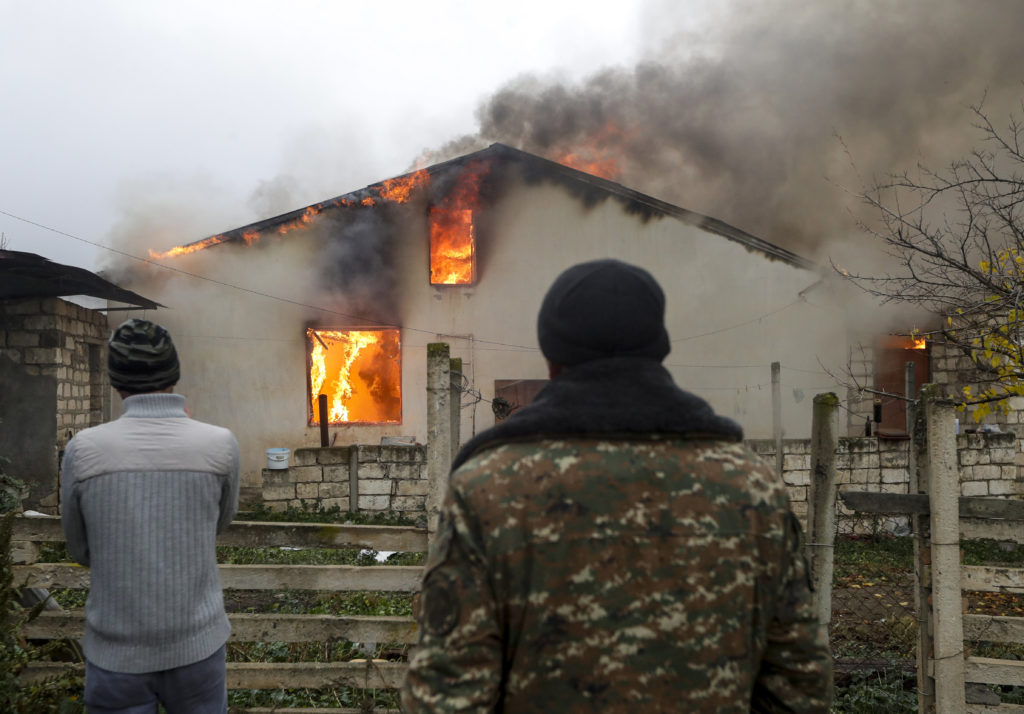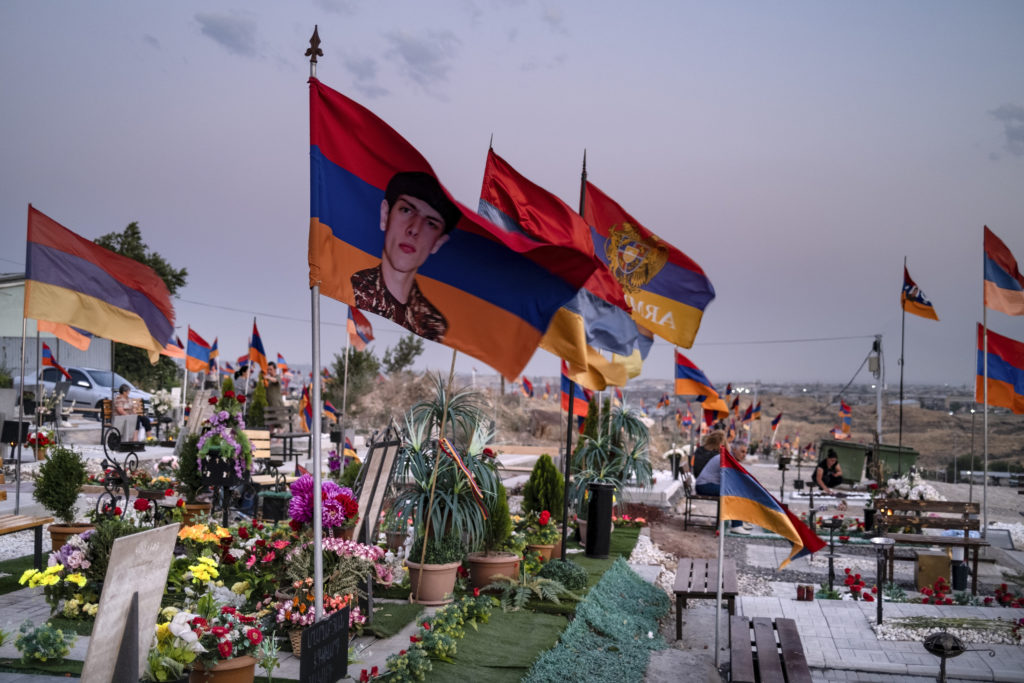
A year and a half after the signing of a fragile ceasefire and the end of active hostilities between Azerbaijan and Armenia, it is difficult not to see a heavy defeat of multilateralism in the military offensive launched by Azerbaijan in the autumn of 2020. Azerbaijan was certainly unable to reach all of its territorial aims – the Republic of Nagorno-Karabakh, though fragilized and amputated of important swaths of its territories, continues to exist and remains staunchly Armenian. Azerbaijani President Ilham Aliyev, however, did achieve another one of his objectives: to withdraw from the peace process established in 1992 under the auspices of the Minsk Group, co-chaired by the United States, France and Russia.
Since November 2020, both Turkey, which offered considerable and enthusiastic military support to its Azerbaijani “brothers” during the war, and Russia, which seized the opportunity provided by the war to place its own peacekeepers, were able to expand their influence in the South Caucasus, practically eliminating that of the established multilateral framework.
Canada, by the voice of its successives ministers of foreign affairs, has since reiterated its support for the Minsk Group-led peace process, but its words – like those of France and the United States – are ringing more and more hollow in light of a whole new geopolitical reality in the region.
Armenia, short of options, seemingly attempted to reverse this trend by bringing the Nagorno-Karabakh conflict before the International Court of Justice (ICJ) as an ultimate attempt to force the international community to pay attention – however unwillingly – to the crisis still raging in the Caucasus. In its application starting proceedings and request for interim measures, filed in September 2021, Armenia explained that it feared imminent and irreparable harm to the rights and the survival of Armenians inhabiting Nagorno-Karabakh, and the deliberate destruction of Armenian cultural heritage sites. Azerbaijan replied the following week with its own counter-claim.

Prior to deciding on the merits of the case, the ICJ delivered its provisional measures, aimed at both Armenia and Azerbaijan. Azerbaijan was thus orderered to “[p]rotect from violence and bodily harm all persons captured in relation to the 2020 Conflict […] and ensure their security and equality before the law” and “[t]ake all necessary measures to prevent and punish acts of vandalism and desecration affecting Armenian cultural heritage.” Both parties must also “[t]ake all necessary measures to prevent the incitement and promotion of racial hatred” and “refrain from any action which might aggravate or extend the dispute before the Court or make it more difficult to resolve.”
On January 31, 2022, Canada took notice of the ICJ’s orders and called on “the respective governments to fully abide by [them].” Three days later, Azerbaijan announced the creation of a working group made up of so-called specialists of Caucasian Albanian history and mandated with the task of “remov[ing] the fictitious traces written by Armenians on Albanian religious temples.” Azerbaijan has been promoting for the last 60 years a theory, devoid of any scientific basis, that any Armenian construction, inscription or relic on the territory of Nagorno-Karabakh is actually the work of the ancient Christian Albanian Kingdom (no relation with the present state of Albania in the Balkans) that reigned over the territory from the 5th to the 9th century. Azerbaijan’s army also destroyed, 15 years ago, dozens of churches and thousands of cross stones, Armenian cultural jewels, in the city of Julfa, Azerbaijan.
The idea behind this new working group – which was denounced by the United States Commission on International Religious Freedom and the European Parliament, which strongly condemned Azerbaijan’s continued policy of erasing and denying the Armenian cultural heritage in and around Nagorno-Karabakh – was thus not particularly novel. Today, however, it appears to be a deliberate slight toward the ICJ, from a government that has never hesitated to openly defy human rights and the relevant international normative framework. In fact, by multiplying its breaches of the ceasefire these last few weeks while the Ukrainian tragedy monopolizes media attention, Azerbaijan has shown the respect it gives to the court’s final order regarding the obligation not to aggravate the dispute.

Can a country like Canada allow such a brazen attempt to render the ICJ toothless? The mandate letter of Minister of Foreign Affairs Mélanie Joly – who has in the past shown herself to be quite sensitive to the fate of Nagorno-Karabakh – outlines many reasons why Canada should act, and offers potential courses of action.
As such, intervening to ensure that Azerbaijan complies with the ICJ’s orders is entirely coherent with Minister Joly’s responsibility to work to ensure that the UN, of which the ICJ is one of six primary bodies, be “more effective, efficient, relevant and accountable [and] supports a rules-based international system.” It is worth remembering that the ICJ’s orders are mandatory, though it has no means to execute them.
Nothing further erodes trust in a judicial system than an unenforceable judgment, however well-founded it may be. Canada’s reaction will be all the more important as the ICJ may soon impose emergency provisional measures on Russia, which has decided to boycott the hearings rather than contesting Ukraine’s application. The rule of law and the appearance of an impartial international justice system would be severely undermined if its most ardent defenders decide to deliberately allow some ICJ decisions to go unnoticed while demanding that others be respected.
Canada’s responsibility in the Nagorno-Karabakh crisis
In the Karabakh crisis, Canada must support rules-based international order
Of course, the suggestion here is not to deploy the Canadian army in the Caucasus. Canada’s diplomatic corps, however, can be more engaged, particularly within the UN’s bodies. UNESCO’s director general proposed as early as October 2020 to “carry out a preliminary field mission, in order to draw up an inventory of the most significant cultural assets, as a prerequisite for effective protection of the region’s heritage.” The urgency of such measures need no longer be demonstrated, and Canada should not shy away from demanding it.
In the same spirit, UN experts called for the release of all captives in February 2021. The call provoked mixed reactions due to its textbook diplomatic neutrality, by which no distinction was made between the handful of Azerbaijani captives and the hundreds of Armenian captives, many of whom were being tortured live on social media. This false equivalence, already shaky in early 2021, is simply indefensible today, as evidenced by the ICJ order. It is vital for the very credibility of the UN that it exert all the pressure required to ensure that this order be respected. Canada and its likeminded partners can no longer continue to fall back on the International Committee of the Red Cross to justify their inaction.

The ICRC’s work on the ground remains essential, but its mandate requires it to be neutral and independent. It is now long overdue to add a robust diplomatic dimension to the issue by requesting the UN Secretary-General and High Commissioner for Human Rights to establish a commission of inquiry to ensure that Armenian captives in Azerbaijan are protected or, better yet, released.
If serious diplomatic efforts fail, Canada and its key partners have a highly useful legislative tool to reply to despots everywhere, the Justice for Victims of Corrupt Foreign Officials Act, more commonly referred to as the Sergei Magnitsky Law, which Minister Joly is also tasked with using and promoting.
A decision to apply targeted sanctions to Azerbaijani officials, including President Aliyev, would be entirely coherent with sanctions imposed by Canada in response to human-rights violations against the Rohingyas in Myanmar in 2018, and gross violations of internationally recognized human rights and acts of significant corruption in Venezuela in 2017. The plight of Armenian captives, detained in terrible conditions and dragged before the court for show trials, is also eerily reminiscent of Sergei Magnitsky’s own tragic fate, whose treatment during his investigation and pretrial detention led to targeted sanctions by Canada against dozens of Russian officials.
Ilham Aliyev, who inherited the presidency from his father almost 20 years ago, has a long track record containing many other grounds for sanctions. One need only think of the blogger Mahammad Mirzali, now in hiding in France, where he was nevertheless stabbed and shot after a warning to stay quiet by none other than the deputy speaker of Azerbaijan’s Parliament. Fearing for his life, the NGO Reporters without Borders has asked France to provide him with additional security. Here, too, one can’t help but remember the tragic story of Jamal Khashoggi, whose murder led to the imposition of Canadian sanctions against 17 Saudi nationals in 2018.
Seeing the South Caucasus as it really is
Time for Canada to intervene as World Court tackles the Rohingya crisis
High-ranking Azerbaijani officials have earned the reputation of being both corrupt and corrupters, as the misappropriation of national resources pervades the country’s economy, and the corruption of foreign politicians and academics is an integral part of the country’s foreign policy. Canada must indeed pay close attention to the case of Henry Cuellar, a member of the United States House of representatives, whose home and office were both raided by the FBI in what is believed to be an investigation about Azerbaijan. It would be naive to imagine that our country and parliamentarians are shieled from such manoeuvres.
Given Canada’s traditionally cautious approach to the region, it would be highly optimistic to believe that it will take the lead on this file. It is also true that such sanctions are much more effective when applied multilaterally. The conversation, however, deserves to take place, and nothing should prevent Minister Joly from instigating it – quite to the contrary. In fact, if the eyes of Canada and its allies are riveted on the Ukraine today, and if some were looking toward Baku, the capital of Azerbaijan, to develop an alternative plan to Russian oil, the announcement of a new strategic alliance between Russia and Azerbaijan on the eve of the attack on Ukraine certainly sets the record straight. But beyond geopolitical interests, which may vary from one day to another, it is the pursuance of the rule of law as an objective in and of itself that should motivate Canadian action as the closest thing to a guarantee of predictability in a region and a world that, today, is sorely lacking.




